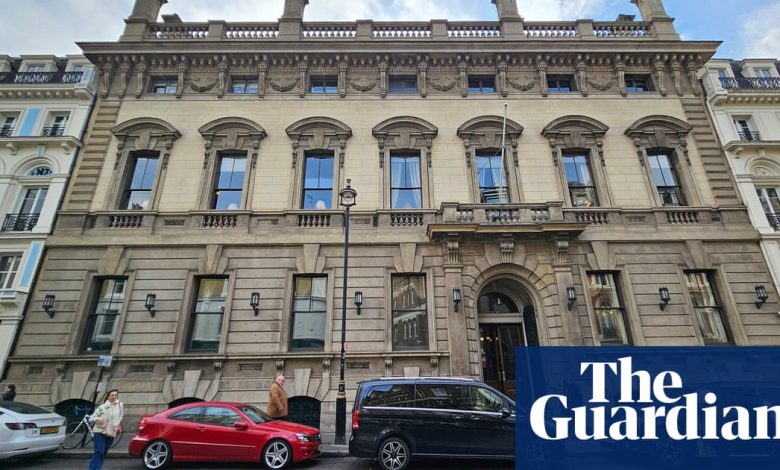Garrick Club votes to accept female members for first time | Garrick Club

[ad_1]
Only the men Garrick Club finally voted to allow women to become members, 193 years after the London institution first opened its doors.
The vote was passed with 59.98% in favor at the end of a private meeting where several hundred members spent two hours debating the merits of allowing women to join.
The meeting was closed to non-members and a warning was given by the club secretary before the vote that details of the occasion were confidential and should not be discussed with non-members.
Hundreds of Garrick members, many of them wearing the club’s pink and green striped tie, had gathered at the Connaught Rooms in Covent Garden in the late afternoon to vote. Most had hoped the vote would end six weeks of intense scrutiny of the club’s internal affairs, sparked by the Guardian’s publication of a list of around 60 names of the club’s most powerful members.
Garrick’s heavily guarded membership list revealed that the club remains a mainstay of Britain’s still male-dominated establishment. Listed next to the king were the deputy prime minister, dozens of leading lawyers, dozens of members of the House of Lords, 10 MPs, as well as heads of influential think tanks, law firms and private equity firms, academics, senior journalists and the head of the independent standards body in the press.
It showed that members were overwhelmingly white and most were over 50 years of age. Many theater directors, producers and actors, from Benedict Cumberbatch to Brian Cox, are also members.
The club’s leadership revealed it had received letters and emails from more than 200 members informing them they would resign if the vote was against women. The musicians A sting and Mark Knopfler and actor Stephen Fry wrote that they would resign because the “public controversy over this matter” had put them in an untenable position, jeopardizing their relationships with female colleagues.
Campaign for greater diversity in politics and greater representation of women in public leadership roles had responded with horror in March until it was revealed that Simon Case, who as cabinet secretary led more than half a million civil servants, and Richard Moore, head of the Secret Intelligence Service, were members.
Moore and Case have both repeatedly spoken about the need to increase diversity in their workforce resigned from the club days after their membership was announced. At least four judges also resigned their membership of the Garrick amid intense media focus on the large number of senior lawyers who were members of a club that had previously voted several times since 1980 to block the admission of women.
Women working in arts also expressed frustration over the past few weeks at the large number of their colleagues who were members of a club where women were only allowed to visit if men accompanied them around the premises as guests. Jude Kelly, a theater director and founder of the Women of the World Foundation, describes feeling “humiliated” on occasions when she was invited to the club for theater-related events.
“I’m glad that men who were previously comfortable with the club being a men’s only club have had a second thought and decided they are now uncomfortable with this arrangement,” she said. “These clubs were created as places for people who were given higher privileges. It’s not the same as an all-girls picnic or an all-boys cricket club. It is a place that supports male power.
The decision to admit women rested on legal technicalities rather than a deep desire among members to associate with women. New analysis of the club’s rules by several of Britain’s most senior judges, including two former chief justices, concluded there was nothing to prevent women being allowed to join, as the Property Act 1925 advised in legal documents the word “he” also used to be read as meaning “she”.
Women’s supporters have already drawn up a list of seven women now planning to nominate for membership: classic Mary Beard, former home secretary Amber Rudd, Channel 4 news anchor Cathy Newmannew Labor peer Ayesha Hazarika, actor Juliet Stevenson, Margaret Casey-Hayford, who chairs the trustees of Shakespeare’s Globe and is chancellor of Coventry University, and Elizabeth Gloucester, a former Court of Appeal judge.
The club’s admissions process is extremely complicated and slow, requiring names to be entered in a red leather-bound book supported by two pages of signatures before prospective members are invited to dine at the club and their membership is discussed by committee members , with the possibility of unpopular nominees being black.
Despite Tuesday’s vote, there may not be a radical change in the club’s line-up any time soon.
[ad_2]




